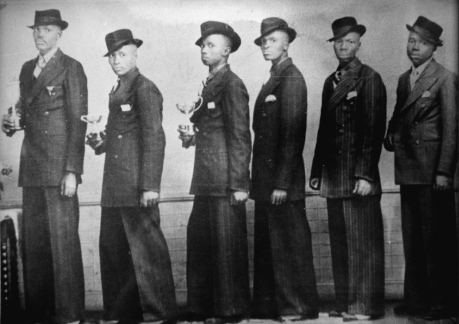Case Study
CASE STUDY
In the Jungle, the Unjust Jungle, a Small Victory
by Sharon Lafraniere
As Solomon Linda first recorded it in 1939, it was a tender melody, almost childish in its simplicity—three chords, a couple of words and some baritones chanting in the background.
But the saga of the song now known worldwide as “The Lion Sleeps Tonight” is anything but a lullaby. It is fraught with racism and exploitation and, in the end, 40-plus years after his death, brings a measure of justice. Were he still alive, Solomon Linda might turn it into one heck of a ballad. Born in 1909 in the Zulu heartland of South Africa, Mr. Linda never learned to read or write, but in song he was supremely eloquent. After moving to Johannesburg in his midtwenties, he quickly conquered the weekend music scene at the township beer halls and squalid hostels that housed much of the city’s black labor force.
He sang soprano over a four-part harmony, a vocal style that was soon widely imitated. By 1939, a talent scout had ushered Mr. Linda’s group, the Original Evening Birds, into a recording studio where they produced a startling hit called “Mbube,” Zulu for “The Lion.” Elizabeth Nsele, Mr. Linda’s youngest surviving daughter, said it had been inspired by her father’s childhood as a herder protecting cattle in the untamed hinterlands.
From there, it took flight worldwide. In the early fifties, Pete Seeger recorded it with his group, the Weavers. His version differed from the original mainly in his misinterpretation of the word “mbube” (pronounced “EEM-boo-beh”). Mr. Seeger sang it as “wimoweh,” and turned it into a folk music staple.
There followed a jazz version, a night-club version, another folk version by the Kingston Trio, a pop version, and finally, in 1961, a reworking of the song by an American songwriter, George Weiss. Mr. Weiss took the last 20 improvised seconds of Mr. Linda’s recording and transformed it into the melody. He added lyrics beginning, “In the jungle, the mighty jungle.” A teen group called the Tokens sang it with a doo-wop beat—and it topped charts worldwide. Some 150 artists eventually recorded the song. It was translated into languages from Dutch to Japanese. It had a role in more than 13 movies. By all rights, Mr. Linda should have been a rich man.
Instead, he lived in Soweto with barely a stick of furniture, sleeping on a dirt floor carpeted with cow dung. Mr. Linda received 10 shillings—about 87 cents today—when he signed over the copyright of “Mbube” in 1952 to Gallo Studios, the company that produced his record. When Mr. Linda died in 1962, at 53, with the modern equivalent of $22 in his bank account, his widow had no money for a gravestone.
How much he should have collected is in dispute. Over the years, he and his family have received royalties for “Wimoweh” from the Richmond Organization, the publishing house that holds the rights to that song, though not as much as they should have, Mr. Seeger said. But where Mr. Linda’s family really lost out, his lawyers claim, was in “The Lion Sleeps Tonight,” a megahit. From 1991 to 2000, the years when “The Lion King” began enthralling audiences in movie theaters and on Broadway, Mr. Linda’s survivors received a total of perhaps $17,000 in royalties, according to Hanro Friedrich, the family’s lawyer.

The Lindas filed suit in 2004, demanding $1.5 million in damages, but their case was no slam-dunk. Not only had Mr. Linda signed away his copyright to Gallo in 1952, … but his wife, who was also illiterate, signed them away again in 1982, followed by his daughters several years later. In their lawsuit, the Lindas invoked an obscure 1911 law under which the song’s copyright reverted to Mr. Linda’s estate 25 years after his death. On a separate front, they criticized the Walt Disney Company, whose 1994 hit movie “The Lion King” featured a meerkat and warthog singing “The Lion Sleeps Tonight.” Disney argued that it had paid Abilene Music for permission to use the song, without knowing its origins.
In February 2006, Abilene agreed to pay Mr. Linda’s family royalties from 1987 onward, ending the suit. No amount has been disclosed, but the family’s lawyers say their clients should be quite comfortable. 
Source: Excerpted from Sharon Lafraniere, “In the Jungle, the Unjust Jungle, a Small Victory,” New York Times, March 22, 2006, p. A1.